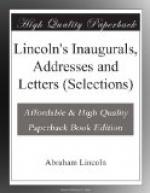Our national strife springs not from our permanent part, not from the land we inhabit, not from our national homestead. There is no possible severing of this but would multiply, and not mitigate, evils among us. In all its adaptations and aptitudes it demands union and abhors separation. In fact, it would ere long force reunion, however much of blood and treasure the separation might have cost.
Our strife pertains to ourselves—to the passing generations of men; and it can without convulsion be hushed forever with the passing of one generation. . . .
I do not forget the gravity which should characterize a paper addressed to the Congress of the nation by the Chief Magistrate of the nation. Nor do I forget that some of you are my seniors, nor that many of you have more experience than I in the conduct of public affairs. Yet I trust that in view of the great responsibility resting upon me, you will perceive no want of respect to yourselves in any undue earnestness I may seem to display.
Is it doubted, then, that the plan I propose, if adopted, would shorten the war, and thus lessen its expenditure of money and of blood? Is it doubted that it would restore the national authority and national prosperity, and perpetuate both indefinitely? Is it doubted that we here—Congress and Executive—can secure its adoption? Will not the good people respond to a united and earnest appeal from us? Can we, can they, by any other means so certainly or so speedily assure these vital objects? We can succeed only by concert. It is not “Can any of us imagine better?” but, “Can we all do better?” Object whatsoever is possible, still the question occurs, “Can we do better?” The dogmas of the quiet past are inadequate to the stormy present. The occasion is piled high with difficulty, and we must rise with the occasion. As our case is new, so we must think anew and act anew. We must disenthral ourselves, and then we shall save our country.
Fellow-citizens, we cannot escape history. We of this Congress and this administration will be remembered in spite of ourselves. No personal significance or insignificance can spare one or another of us. The fiery trial through which we pass will light us down, in honor or dishonor, to the latest generation. We say we are for the Union. The world will not forget that we say this. We know how to save the Union. The world knows we do know how to save it. We—even we here—hold the power and bear the responsibility. In giving freedom to the slave, we assure freedom to the free—honorable alike in what we give and what we preserve. We shall nobly save or meanly lose the last, best hope of earth. Other means may succeed; this could not fail. The way is plain, peaceful, generous, just—a way which, if followed, the world will forever applaud, and God must forever bless.
ABRAHAM LINCOLN.
Washington, Dec. 1, 1862.




